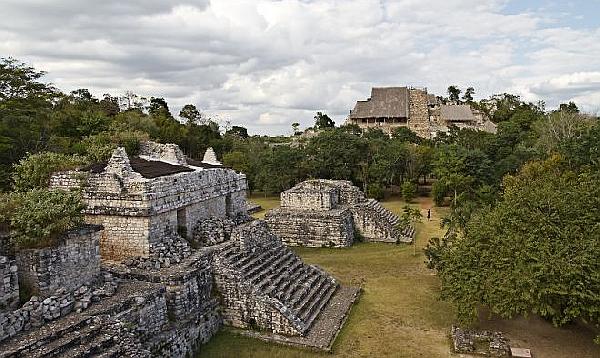Mexico City, Mexico – The end of the current era in the Mayan long-count calendar is approaching. With dancing, incense, and rituals designed to thank the gods, the Mayans performed the "New Fire" ceremony Thursday at a park in Mexico City, but complained they have been barred by authorities from performing rituals at their ancestral temples in the Maya region.
The Mayans measure time in 394-year periods known as "Baktuns." The 13th Baktun ends December 21, 2012, and 13 is considered a sacred number for the Maya.
The estimated 800,000 surviving Mayans in Mexico are hoping for a better new Baktun than the one now ending, which began around 1618. It included the painful aftermath of the Spanish conquest in which Mayans and other indigenous groups saw their temples and sacred writings systematically destroyed and their population decimated by European diseases and forced labor.
"This is the ending of an era for the Maya, an era which has been very intense for us, in which we have had suffering and pain," said Mayan priest Jose Manrique Esquivel, 52, who wore a feather headdress and body paint for the ceremony. For the new Baktun, he said, "we are praying the wars, the conflicts, the hunger to end."
"The Maya survived all of the suffering with their pride intact. We were not conquered, we are still here, we are alive and so is our culture our language, our food, our history," Manrique Esquivel said.
 |
The priest, who is in agreement with most archaeologists and astronomers, doesn't believe the ancient Mayans predicted the world would end with the close of the current Baktun. Some bloggers and astronomy fans have suggested the Mayan calendar would "run out" on December 21st.
Despite the generally festive atmosphere at the ceremony, there was some discontent that the government won't allow Mayan priests and healers to perform their ceremonies inside archaeological sites - like Chichen Itza, Coban, and Tulum - that their ancestors built.
"We would like to do these ceremonies in the archaeological sites, but unfortunately they won't let us enter," Manrique Esquivel said. "It makes us angry, but that's the way it is ... we perform our rituals in patios, in fields, in vacant lots... wherever we can."
Francisco de Anda, the press director for the government's National Institute of Anthropology and History, which oversees archaeological sites in Mexico, said there were two reasons for the ban on ceremonies. "In part it is for visitor safety, and also for preservation of the sites, especially on dates when there are massive numbers of visitors."
"For example," he noted, "at the spring equinox in 2011, about 35,000 people visited Chichen Itza on a single day. Throngs of that size create potential hazards on stairways and in other steep or narrow spots, and holding ceremonies with fire or incense might add to that."
"Many of the groups that want to hold ceremonies bring braziers and want to burn incense, and that simply isn't allowed," De Anda added.
Moreover, they probably couldn't perform rituals on the temple platforms where their ancestors worshipped, because the structures could deteriorate under the weight and the foot traffic of the gatherings.
"For conservation reason, there is a ban on climbing up about 80 percent of the structures at Chichen Itza," De Anda said.
De Anda stated that a "big spike" in visitors was also expected at sites like the ruins of the Mayan city of Coban and the seaside ruins at Tulum, where similar rules are in effect.
Saul Ancona, the tourism secretary for Yucatan, the state in southern Mexico with the largest Mayan population, said the Mayans would be very much present in what is being billed as the "Festival of the Maya Culture" planned to coincide with December 21st.
He said that a presentation called "Sacred Moments of the Maya" would be performed by about 250 Mayans in the Yucatan city of Valladolid and that the state was promoting the date as a chance for visitors "to enjoy Mayan culture and get to know the Mayans."
Ancona is so sure the world isn't going to end that the state tourism department is already planning the 2013 edition of the festival. "What we have done is to plan a series of festivals, to celebrate a new era, a new beginning," he said.


